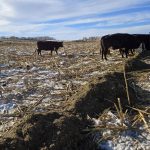No sooner last month had I talked about A & W Restaurants announcing they were switching to natural, hormone-free beef in all their restaurants as part of the healthy-eating trend, and TV commercials showing happy, healthy people eating A & W burgers started.
In that commercial the personable “manager” played by actor Allen Lulu is asking customers what they think of the new hormone-free burgers.
And surprisingly these happy, young consumers said “they were just delicious.” I don’t know if anyone said they were better than the toxic, hormone-laden burgers, but you certainly get that impression.
Read Also

The next project after COOL
I have to give the Canadian Cattlemen’s Association (CCA) and Canada’s federal government credit for their patience and persistence. I…
In many respects, I have no issues with someone marketing natural or organic meat products. If that is what the customer wants, great. And if by some chance they happen to be more tender or more flavourful that is great too. But I bristle when the slant is that these natural beef burgers are better, because conventional beef isn’t good for you.
Consumers like to follow price, but they are also easily swayed by advertising. And that type of advertising rings the alarm bell again that conventional beef is bad.
The Alberta Beef Producers didn’t mention A & W in particular but in a recent release they took issue with the restaurant chain’s move.
“Alberta Beef Producers is very concerned about recent advertising campaigns from some food-service and retail food businesses that seem to present a negative view of our conventional food production methods, systems that have given Canadians one of the best food supplies in the history of human civilization.
“These businesses are choosing to serve their customers beef from cattle that are raised without the use of safe, proven growth products that improve the efficiency and reduce the environmental footprint of beef production.
“This beef is different from the vast majority of beef that is produced in Canada, but in our view, it is certainly not better beef. We are disappointed that these companies are effectively turning their backs on over 68,000 Canadian cattle producers and more than two billion pounds of safe, nutritious, high quality Canadian beef that is produced annually from cattle raised using highly ethical and sustainable methods.
“In some cases, these businesses will be serving their customers imported beef because the companies have not taken the time to find Canadian suppliers of the particular kind of beef they want.
“As an organization working on behalf of over 20,000 cattle producers in Alberta, ABP is reluctant to publicly attack potential customers. However, we do want to remind consumers that there are retail stores, restaurants, and quick service restaurant chains that support Canadian cattle producers and are committed to serving only Canadian beef in their establishments. We encourage Canadian consumers to seek out and support these businesses.”
So that is what ABP had to say. I am not sure what critics consider as being all the hazards of conventionally produced beef, but I have heard one concern is that use of growth promotants will increase estrogen levels in humans.
So I was interested in a chart posted by Alberta farmer Rod Bradshaw (courtesy of mobeef.org) that showed a comparison of how hormones in implanted beef contribute to estrogen levels. If this research is correct I think it will be more important for the beef guys to get on board with a campaign protecting the public from pea soup and cabbage.










